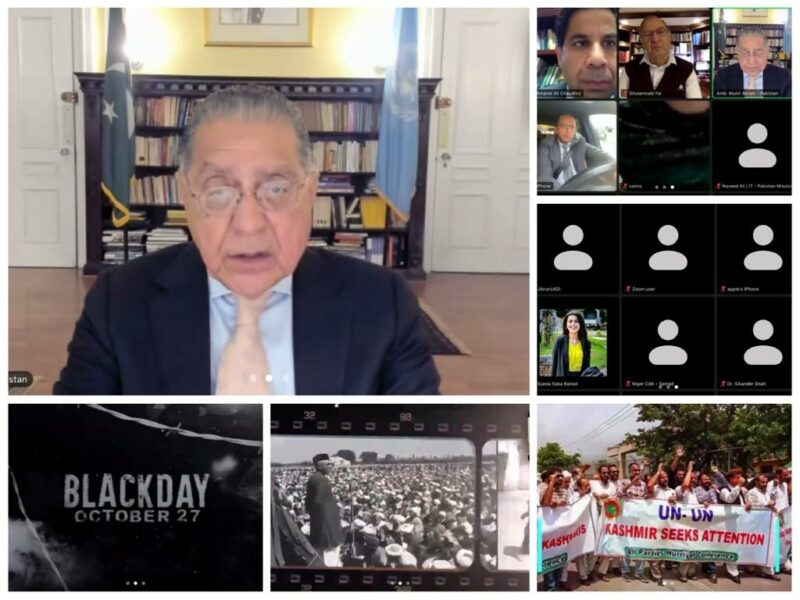NEW YORK: Pakistan’s Ambassador to the UN Munir Akram has called on the international community to press India to halt its violations of human rights in occupied Jammu and Kashmir and implement the relevant UN Security Council resolutions that grant the Kashmiri people their right to self-determination.
“The voices of freedom in Kashmir have been silenced through this campaign of repression,” he said at a webinar organized by the Pakistan Mission to mark the Kashmir Black Day.
“Seventy-six years ago, on this day, India sent its army into occupied the territory of Jammu and Kashmir,” Ambassador Akram told a panel of distinguished speakers which included representatives of Saudi Arabia and Azerbaijan.
Others were: Dr. Ghulam Nabi Fai, secretary-general of the World Awareness Forum; Mashaal Mallick, special assistant to the prime minister on human right and women empowerment; Dr. Sikandar Ahmad Shah, LUMBS professor and former legal adviser to the Ministry of Foreign Affairs, Prof Syed Hussain Shaheed Soherwordi; Dr. Rahat Iqbal, a scholar on an Islamabad think-tank; and Dr. Ramesh Kumar, patron-in-chief of the Pakistan Hindu Council and a former member of parliament.
They voiced their deep concern over the worsening situation in the Indian occupied Kashmir and called on the UN to implement its resolutions to resolve the decades-old dispute.
In his remarks, Ambassador Akram said, “This year, we observed a lack of focus when a tragedy of enormous proportions is unfolding in the midst of another fraternal people, the people of Palestine being subjected to a genocidal attack by another occupying power.”
Noting that 2023 also marks the 75th anniversary of the Universal Declaration on Human Rights, he said the principle of self-determination was embedded in the UN Charter and the Vienna declaration.
“All peoples have the right of self determination,” the Pakistani envoy said, “By virtue of that, they can freely determine their political status and freely pursue their economic, social and cultural.”
The United Nations Security Council resolutions, he said, explicitly stipulate that the final disposition of Jammu and Kashmir will be decided by its people through a free plebiscite under the U.N. auspices. But India had continued through force and fraud, to persist in its occupation and to suppress the fundamental human rights of the Kashmiri people.
Since August 2019, Ambassador Akram said, India has intensified its campaign of annexation through the induction of a military force of 9000 troops, the densest occupation in recent history, and resorting to a vicious campaign of repression, including extra judicial killings as collective punishment.
“To suppress the voice of the Kashmiri people. Indian authorities have employed censorship and surveillance as tools for decades,” he said, adding that they don’t allow any international visits for verification in occupied Kashmir.
“Journalists, lawyers and human rights dependents are routinely incarcerated, beaten, humiliated, embarrassed, and even accused of terrorism,” the Pakistani envoy said, noting that the people of Kashmir experience more internet shutdowns and restrictions than any other region.
The entire Kashmiri leadership, the true representatives of the disputed state’s political aspirations, has been under continued detention, with most of them, including Yasin Malik , subjected to brutal and inhuman treatment at the hands of the occupation forces.
The Pakistani envoy also denounced the Indian scheme of converting the occupied Kashmir Muslim majority into a minority.
Peace in South Asia will not be possible without a just settlement of the Kashmir dispute, he added.
Representatives of Saudi Arabia and Azerbaijan who are part of the OIC Contract Group on Jammu and Kashmir supported Kashmiris’ right to self-determination.
They said that the solution to the problems should be found through dialogue between the parties.
They said that all efforts at the resolution of the dispute should be guided by the UNSC resolutions and international law.


Comments are closed.